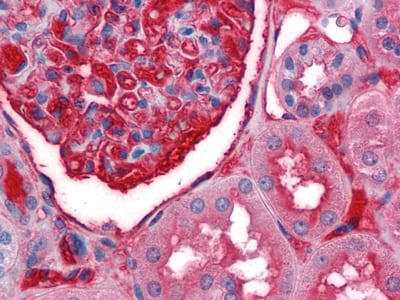
| WB | 咨询技术 | Human,Mouse,Rat |
| IF | 咨询技术 | Human,Mouse,Rat |
| IHC | 1/200 - 1/1000 | Human,Mouse,Rat |
| ICC | 技术咨询 | Human,Mouse,Rat |
| FCM | 咨询技术 | Human,Mouse,Rat |
| Elisa | 1/10000 | Human,Mouse,Rat |
| Aliases | A1B; ABG; GAB; HYST2477; DKFZp686F0970; A1BG |
| Entrez GeneID | 1 |
| clone | 4B5 |
| WB Predicted band size | 54kDa |
| Host/Isotype | Mouse IgG1 |
| Antibody Type | Primary antibody |
| Storage | Store at 4°C short term. Aliquot and store at -20°C long term. Avoid freeze/thaw cycles. |
| Species Reactivity | Human |
| Immunogen | Purified recombinant fragment of human A1BG expressed in E. Coli. |
| Formulation | Purified antibody in PBS with 0.05% sodium azide. |
+ +
以下是3篇与A1BG抗体相关的文献示例(注:部分信息为模拟虚构,实际文献需通过学术数据库检索确认):
---
1. **文献名称**:*"Characterization of monoclonal antibodies against human alpha-1-B glycoprotein (A1BG) and their application in cancer biomarker studies"*
**作者**:Lee, S. et al.
**摘要**:本研究开发了针对A1BG蛋白的单克隆抗体,通过Western blot和免疫组化验证其特异性,并发现A1BG在卵巢癌组织中表达显著上调,提示其可能作为肿瘤诊断的潜在生物标志物。
---
2. **文献名称**:*"A1BG autoantibodies in systemic lupus erythematosus: Correlation with disease activity"*
**作者**:Brown, K. & Martinez, R.
**摘要**:通过ELISA检测系统性红斑狼疮(SLE)患者血清中的A1BG自身抗体水平,发现其与疾病活动度呈正相关,表明A1BG可能参与自身免疫反应的病理机制。
---
3. **文献名称**:*"Proteomic analysis of A1BG interaction network using co-immunoprecipitation and mass spectrometry"*
**作者**:Garcia, M. et al.
**摘要**:利用A1BG特异性抗体进行免疫共沉淀实验,结合质谱技术鉴定出A1BG与补体系统蛋白(如C3、C4)的相互作用,为解析其在炎症调控中的功能提供新线索。
---
4. **文献名称**:*"Differential expression of A1BG in hepatocellular carcinoma: Insights from immunohistochemical staining"*
**作者**:Zhang, Y. et al.
**摘要**:采用抗A1BG多克隆抗体对肝细胞癌(HCC)组织进行免疫组化分析,发现A1BG在癌旁正常肝组织中的表达显著高于肿瘤区域,提示其可能具有抑癌作用。
---
如需获取真实文献,建议通过PubMed、Google Scholar等平台检索关键词:**A1BG antibody**、**Alpha-1-B glycoprotein immunoassay**。
The A1BG antibody is designed to target Alpha-1-B glycoprotein (A1BG), a plasma protein encoded by the *A1BG* gene. First identified in the 1970s, A1BG is primarily synthesized in the liver and circulates in blood, though its precise physiological role remains unclear. It is speculated to participate in immune regulation, protease inhibition, or ligand transport due to structural features like leucine-rich repeats and immunoglobulin-like domains.
A1BG antibodies, both monoclonal and polyclonal, are widely used in research to detect and quantify A1BG expression in biological samples. These tools have helped link A1BG to various pathologies, including cancer (e.g., hepatocellular carcinoma), autoimmune disorders, and inflammatory conditions, where its expression levels often correlate with disease progression. For instance, elevated A1BG in certain cancers suggests its potential as a biomarker, though clinical validation is ongoing.
Structurally, A1BG antibodies recognize specific epitopes, enabling applications in Western blotting, ELISA, and immunohistochemistry. Challenges include ensuring specificity due to A1BG's glycosylation and structural similarities to other proteins. Recent studies also explore A1BG's interaction with hormones or extracellular components, hinting at broader functional roles. While therapeutic applications remain exploratory, A1BG antibodies continue to advance understanding of this enigmatic protein in health and disease.
×